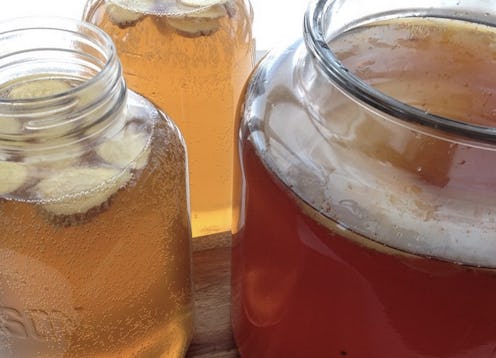Life
Kombucha Isn't As Healthy As You Thought

Though I am no health food expert — I have no idea what chia seeds do and wouldn’t know what tempeh was even if it was staring me in the face — I have heard of kombucha tea and its supposed health benefits. Having gone to a liberal arts school, I saw a lot of peers chugging the stuff, making faces at the taste but looking forward to the health benefits…unfortunately, it looks like that day may never come for my brave fermented-tea-chugging friends; it turns out that kombucha might not be good for you after all.
Just like the juice cleanse health craze, the actual health benefits of kombucha may fall much shorter than previously thought. Kombucha devotees have claimed that the fermented tea can cure cancer, prevent diseases, improve energy, reverse aging, aid digestion, alleviate liver problems, help aching joints, and more. But there is one major problem with these claims: many of them are unproven. A recent study in Comprehensive Reviews in Food Science and Food Safety found that “there has been no evidence published to date on the biological activities of kombucha in human trials.” Another 2003 study found that the health benefits of kombucha were “largely undetermined,” and a spokesperson from the Academy of Nutrition and Dietetics told NPR, “There is really very little evidence to support any kind of claims about kombucha tea…so we don't know if it does anything at all."
So what do we actually know about kombucha’s effect on the body? The health benefits of kombucha that authorities can agree on come from the tea’s probiotics, which are good for your digestive system, and may be good for your mood as well. But that doesn’t make Kombucha a super food…probiotics can also been found in (tastier) Greek yogurt and miso. Furthermore, there are actually many well-documented adverse health effects associated with home-brewed kombucha, including heart attacks, liver damage, and even one death. And if you decided that you actually want to shell out $5 for a bottle of Kombucha at a health food store, be weary of the label — many companies add sugar to their kombucha to offset the vinegary taste, with the unfortunate side effect of counteracting the health benefits as well.
Now, all of this isn’t to say that kombucha doesn’t have amazing health benefits —it absolutely could, but nothing has been proven yet. Unfortunately, most of the concrete evidence we have on kombucha is the negative side effects of unsanitary or faulty home brewing. So if you are still a kombucha believer (and ain’t nothing wrong with that!) be sure to be careful while making the tea at home, and keep an eye out for new studies on the tea. Who knows, in five years we might find that kombucha is the fountain of youth after all.
Image: Synergy Drinks